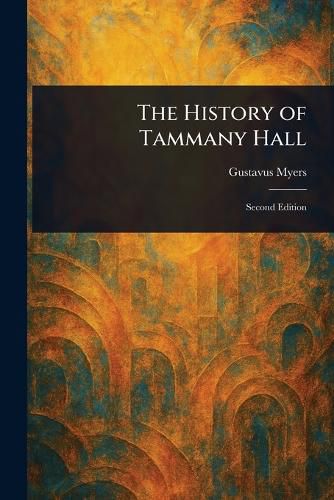Readings Newsletter
Become a Readings Member to make your shopping experience even easier.
Sign in or sign up for free!
You’re not far away from qualifying for FREE standard shipping within Australia
You’ve qualified for FREE standard shipping within Australia
The cart is loading…






This title is printed to order. This book may have been self-published. If so, we cannot guarantee the quality of the content. In the main most books will have gone through the editing process however some may not. We therefore suggest that you be aware of this before ordering this book. If in doubt check either the author or publisher’s details as we are unable to accept any returns unless they are faulty. Please contact us if you have any questions.
Gustavus Myers's "The History of Tammany Hall" offers a comprehensive look into the infamous New York City political machine. This second edition explores the origins, rise, and impact of Tammany Hall, a powerful force in 19th-century politics. Delve into the inner workings of this Democratic Party institution and its profound influence on the city's social and political landscape.
Uncover the intricate details of Tammany Hall's organization, its strategies, and its role in shaping American political processes. Myers meticulously examines the organization's involvement in political corruption and its lasting impact on New York City history. This volume is essential reading for anyone interested in understanding the dynamics of political machines, the complexities of 19th-century American history, and the enduring legacy of Tammany Hall.
This work has been selected by scholars as being culturally important, and is part of the knowledge base of civilization as we know it.
This work is in the public domain in the United States of America, and possibly other nations. Within the United States, you may freely copy and distribute this work, as no entity (individual or corporate) has a copyright on the body of the work.
Scholars believe, and we concur, that this work is important enough to be preserved, reproduced, and made generally available to the public. We appreciate your support of the preservation process, and thank you for being an important part of keeping this knowledge alive and relevant.
$9.00 standard shipping within Australia
FREE standard shipping within Australia for orders over $100.00
Express & International shipping calculated at checkout
This title is printed to order. This book may have been self-published. If so, we cannot guarantee the quality of the content. In the main most books will have gone through the editing process however some may not. We therefore suggest that you be aware of this before ordering this book. If in doubt check either the author or publisher’s details as we are unable to accept any returns unless they are faulty. Please contact us if you have any questions.
Gustavus Myers's "The History of Tammany Hall" offers a comprehensive look into the infamous New York City political machine. This second edition explores the origins, rise, and impact of Tammany Hall, a powerful force in 19th-century politics. Delve into the inner workings of this Democratic Party institution and its profound influence on the city's social and political landscape.
Uncover the intricate details of Tammany Hall's organization, its strategies, and its role in shaping American political processes. Myers meticulously examines the organization's involvement in political corruption and its lasting impact on New York City history. This volume is essential reading for anyone interested in understanding the dynamics of political machines, the complexities of 19th-century American history, and the enduring legacy of Tammany Hall.
This work has been selected by scholars as being culturally important, and is part of the knowledge base of civilization as we know it.
This work is in the public domain in the United States of America, and possibly other nations. Within the United States, you may freely copy and distribute this work, as no entity (individual or corporate) has a copyright on the body of the work.
Scholars believe, and we concur, that this work is important enough to be preserved, reproduced, and made generally available to the public. We appreciate your support of the preservation process, and thank you for being an important part of keeping this knowledge alive and relevant.